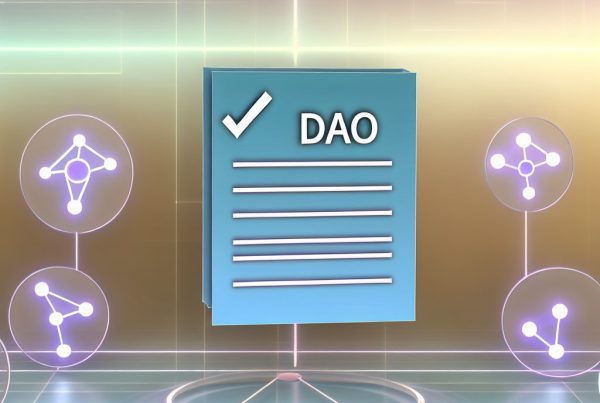Understanding Zero-Knowledge Proofs in the Cryptocurrency Industry
In the rapidly evolving world of cryptocurrency, privacy and security are paramount. As digital transactions become more prevalent, the need for innovative solutions to protect user data has never been greater. One such solution is the concept of zero-knowledge proofs (ZKPs). This article delves into what zero-knowledge proofs are, how they function, their significance in the cryptocurrency industry, and their real-world applications.
What Are Zero-Knowledge Proofs?
Zero-knowledge proofs are cryptographic methods that allow one party (the prover) to prove to another party (the verifier) that a statement is true without revealing any additional information about the statement itself. This concept is particularly useful in scenarios where privacy is crucial, such as in financial transactions.
The term “zero-knowledge” signifies that the verifier learns nothing beyond the validity of the statement. For instance, if Alice wants to prove to Bob that she knows a secret password without actually revealing the password, she can use a zero-knowledge proof to accomplish this.
How Do Zero-Knowledge Proofs Work?
Zero-knowledge proofs operate on a few fundamental principles:
- Completeness: If the statement is true, an honest prover can convince an honest verifier of its truth.
- Soundness: If the statement is false, no dishonest prover can convince the honest verifier that it is true.
- Zero-knowledge: If the statement is true, the verifier learns nothing other than the fact that the statement is true.
To illustrate this, consider the classic example of the “Ali Baba cave.” In this scenario, a prover (Alice) wants to convince a verifier (Bob) that she knows the secret to a hidden door in a cave without revealing the secret itself. Alice can enter the cave and, using a series of challenges and responses, demonstrate her knowledge without disclosing the actual secret.
The Importance of Zero-Knowledge Proofs in Cryptocurrency
Zero-knowledge proofs have gained significant traction in the cryptocurrency space due to their ability to enhance privacy and security. Here are some key reasons why ZKPs are essential:

- Enhanced Privacy: ZKPs allow users to conduct transactions without revealing their identities or transaction details, addressing privacy concerns in the blockchain space.
- Regulatory Compliance: ZKPs can help cryptocurrency projects comply with regulations by allowing them to prove compliance without disclosing sensitive information.
- Scalability: Certain implementations of ZKPs can improve the scalability of blockchain networks by reducing the amount of data that needs to be processed and stored.
Types of Zero-Knowledge Proofs
There are several types of zero-knowledge proofs, each with its unique characteristics and applications:
Interactive Zero-Knowledge Proofs
In interactive zero-knowledge proofs, the prover and verifier engage in a back-and-forth communication process. The prover sends a series of responses to challenges posed by the verifier, demonstrating knowledge of the secret without revealing it.
Non-Interactive Zero-Knowledge Proofs (NIZKPs)
Non-interactive zero-knowledge proofs eliminate the need for back-and-forth communication. Instead, the prover generates a proof that can be verified by anyone without further interaction. This type is particularly useful for blockchain applications, where efficiency is crucial.
Succinct Non-Interactive Arguments of Knowledge (SNARKs)
SNARKs are a specific type of non-interactive zero-knowledge proof that is both succinct and efficient. They allow for the verification of complex statements with minimal data, making them ideal for blockchain applications where storage and processing power are limited.
Real-World Applications of Zero-Knowledge Proofs
Zero-knowledge proofs have found various applications in the cryptocurrency industry, enhancing privacy and security across different platforms. Here are some notable examples:
Privacy Coins
Privacy-focused cryptocurrencies like Zcash and Monero utilize zero-knowledge proofs to ensure transaction confidentiality. Zcash employs zk-SNARKs to allow users to send transactions without revealing sender, receiver, or transaction amount. This level of privacy has made Zcash a popular choice for users seeking anonymity in their transactions.
Decentralized Identity Solutions
Zero-knowledge proofs are also being integrated into decentralized identity solutions. Projects like SelfKey and uPort leverage ZKPs to allow users to prove their identity without disclosing sensitive personal information. This approach enhances user privacy while enabling secure access to services.
Smart Contracts
Smart contracts can benefit from zero-knowledge proofs by ensuring that certain conditions are met without revealing the underlying data. For instance, a smart contract could verify that a user has sufficient funds to execute a transaction without disclosing their account balance.
Challenges and Limitations of Zero-Knowledge Proofs
While zero-knowledge proofs offer numerous advantages, they are not without challenges:
- Complexity: Implementing zero-knowledge proofs can be complex and may require specialized knowledge, making it challenging for some developers.
- Performance Overhead: Depending on the implementation, zero-knowledge proofs can introduce performance overhead, potentially slowing down transaction processing times.
- Regulatory Concerns: The use of privacy-enhancing technologies like ZKPs may raise regulatory concerns, particularly in jurisdictions with strict anti-money laundering (AML) and know-your-customer (KYC) regulations.
Future of Zero-Knowledge Proofs in Cryptocurrency
The future of zero-knowledge proofs in the cryptocurrency industry looks promising. As privacy concerns continue to grow, the demand for solutions that protect user data will likely increase. Here are some trends to watch:
- Increased Adoption: More cryptocurrency projects are expected to adopt zero-knowledge proofs to enhance privacy and security features.
- Interoperability: Efforts to create interoperable solutions that leverage zero-knowledge proofs across different blockchain networks may emerge, facilitating seamless transactions.
- Regulatory Clarity: As regulators become more familiar with zero-knowledge proofs, clearer guidelines may emerge, allowing for broader adoption while ensuring compliance.
FAQs About Zero-Knowledge Proofs
What is the main benefit of zero-knowledge proofs?
The primary benefit of zero-knowledge proofs is that they allow one party to prove knowledge of a secret without revealing the secret itself, enhancing privacy and security in transactions.
How do zero-knowledge proofs enhance privacy in cryptocurrencies?
Zero-knowledge proofs enable users to conduct transactions without disclosing their identities or transaction details, thus protecting their privacy in the blockchain ecosystem.
Are zero-knowledge proofs only used in cryptocurrencies?
No, while zero-knowledge proofs are widely used in cryptocurrencies, they also have applications in various fields, including secure voting systems, identity verification, and secure data sharing.
What are zk-SNARKs?
zk-SNARKs (Succinct Non-Interactive Arguments of Knowledge) are a type of non-interactive zero-knowledge proof that allows for efficient verification of complex statements with minimal data, making them suitable for blockchain applications.
Conclusion
Zero-knowledge proofs represent a groundbreaking advancement in cryptography, offering a powerful tool for enhancing privacy and security in the cryptocurrency industry. As the demand for privacy-centric solutions continues to grow, the adoption of ZKPs is likely to increase, paving the way for more secure and private digital transactions.
For those interested in staying updated on cryptocurrency news and price tracking, consider visiting Bitrabo. Follow me on X, Instagram, and Threads for more insights into the crypto world.
Disclaimer: The information provided in this article is for informational purposes only and should not be considered financial advice. Always conduct your own research before making investment decisions.
The Crypto Watchlist of the Week 🔎
Subscribe to receive expert-curated projects with real potential—plus trends, risks, and insights that matter. Get handpicked crypto projects, deep analysis & market updates delivered to you.


